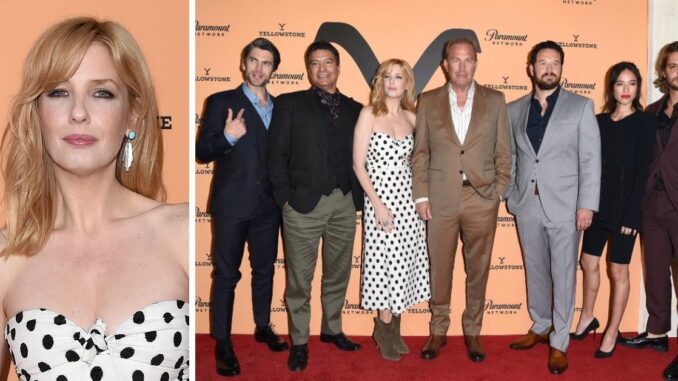
The sun dips low over the horizon of the cultural landscape, casting long, dramatic shadows across what has been, for the better part of six years, the most formidable and captivating vista on television: Yellowstone. The news that Taylor Sheridan's sprawling Western epic is nearing its end isn't just a plot twist for the Dutton family; it's a seismic shift in the streaming frontier, a complex denouement born not just of narrative ambition but of the gritty, often tumultuous realities behind the cameras. To understand why Yellowstone is riding off into the sunset, we must look beyond the barbed wire fences and into the boardrooms, the trailers, and the restless mind of its creator.
From its very first scene, Yellowstone positioned itself as a modern-day myth, a saga of land, legacy, and the brutal lengths one family would go to preserve their sprawling Montana ranch. It captured a demographic starved for authentic American stories, blending the high-stakes drama of Succession with the rugged individualism of a classic Western. Its success was unprecedented, spawning an entire universe of prequels and spin-offs, each further cementing Taylor Sheridan's status as a storytelling titan. Yet, like any empire, even one built on hundreds of thousands of acres, it carries the seeds of its own conclusion.
Behind the majestic vistas and the thundering hooves, the primary fault line in Yellowstone's eventual demise centered squarely on its patriarch, Kevin Costner, who embodies the steely resolve of John Dutton III. Reports of scheduling conflicts, creative differences, and an increasingly strained relationship between Costner and Sheridan became the industry's worst-kept secret. Costner, an Oscar-winning director and actor, reportedly sought to curtail his filming days to pursue other passion projects, most notably his multi-part Western film saga, Horizon. For a show built around the unwavering presence of its lead, this logistical tangle proved insurmountable. It's akin to the main herd's alpha bull deciding to stray; the entire cattle drive is thrown into disarray. The show, reliant on Costner’s gravitas, found itself needing to navigate around its most essential star, a challenge that not only became a practical headache but began to fray the narrative cohesion that had been its bedrock.
Beyond the star power, the end of Yellowstone is also a testament to the ambitious, almost runaway creative empire of Taylor Sheridan himself. A writer, director, and showrunner who churns out content at a breathtaking pace, Sheridan has become the architect of an entire television universe for Paramount. With 1883, 1923, Tulsa King, Mayor of Kingstown, Lawmen: Bass Reeves, and the upcoming 6666 all under his purview, the sheer volume of his output is staggering. This prolificacy, while impressive, inevitably stretches resources, time, and creative energy. There's a point where even the most boundless vision needs a focused endpoint. Perhaps, for Sheridan, the main Yellowstone story, with its established characters and often repetitive cycles of conflict, had reached its natural dramatic arc, or had simply become one too many plates to keep spinning with the meticulous detail he demands. Ending the flagship series allows him to clear the decks, to perhaps funnel its energy and audience into new, forward-looking chapters of the Dutton saga, like the rumored "2024" sequel series. It’s a strategic pivot, not just a cancellation, ensuring the brand continues to expand, unencumbered by the original’s logistical challenges.
Finally, there’s the inherent narrative pull towards a definitive conclusion. Yellowstone has always been a show about a family under siege, fighting to preserve a way of life against modern forces. How many more times can the Duttons survive assassination attempts, political machinations, and betrayals from within their own ranks before the narrative itself becomes exhausted? The cycle of violence, land grabs, and desperate measures has escalated to a fever pitch. A story of this magnitude demands a powerful, cathartic ending, not a slow, meandering fade. The characters have been pushed to their limits; John, Beth, Kayce, and Rip have faced existential threats with every passing season. To continue indefinitely would risk diluting the very stakes that made the show so compelling. The decision to conclude signals a commitment to a powerful final act, a last stand that will, hopefully, bring true resolution or, at the very least, a defining consequence to the Dutton's relentless struggle.
In the end, Yellowstone's conclusion isn't a failure, but a complex, multi-faceted inevitability. It's the confluence of a star's shifting priorities, a showrunner's sprawling ambition, and the natural lifecycle of a television saga that, like the wild frontier it celebrates, cannot remain untamed forever. As the final episodes approach, the audience will undoubtedly mourn the impending silence of the Dutton ranch. But understanding the forces at play behind the scenes – the creative tensions, the business strategies, and the narrative’s natural pulse – allows us to appreciate that even the grandest Western drama must, eventually, ride off into that iconic, fading sunset. And in doing so, it leaves behind a legend as vast and enduring as the Montana skies themselves.
